Politics
The Accidental Insurgent: How Tamil Nadu's Biggest Movie Star May Have Become the DMK's Gravest Threat
S Rajesh
May 17, 2025, 11:24 AM | Updated Jun 02, 2025, 11:36 AM IST
Save & read from anywhere!
Bookmark stories for easy access on any device or the Swarajya app.
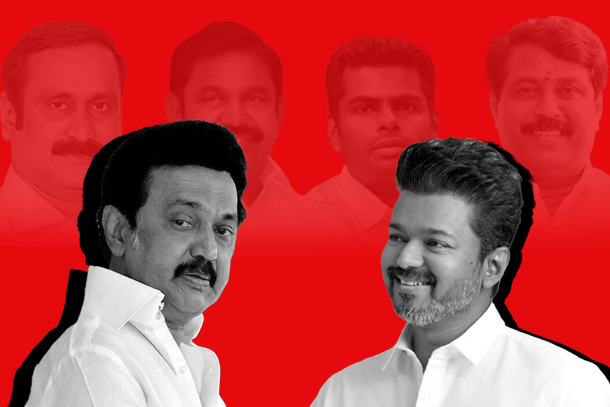
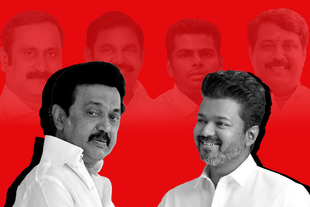
In the humid corridors of Chennai's political establishments, a peculiar irony has begun to unfold. The Dravida Munnetra Kazhagam (DMK)—the party that allegedly orchestrated actor Vijay's entry into politics to fragment the opposition—may have inadvertently engineered its own undoing.
What was meant to be a tactical masterstroke has evolved into something far more unsettling: a genuine grassroots challenge to the very foundation of DMK's power.
Vijay, known to millions as "Thalapathy" (Commander), commands a devotion that transcends the typical relationship between celebrity and admirer. His fans—predominantly young, economically marginalized, and politically restless—represent exactly the demographic that has kept the DMK in power for decades. Added to that, is support for him amongst minorities. These communities, which have traditionally formed a reliable vote bank for the DMK, are increasingly drawn to Vijay's promise of change. Now, as Tamil Nadu approaches its 2026 assembly elections, these same supporters are beginning to see in Vijay not just an entertainer, but a potential deliverer.
The mathematics of this shift are both simple and devastating. Political pundits who initially dismissed Vijay's Tamizhaga Vetri Kazhagam as a vanity project, likely to capture a modest five to eight percent of votes, had based their calculations on certain assumptions. First, considering that Kamal Haasan's Makkal Needhi Maiam (MNM) secured 2.52 percent in 2021, Vijay—being far more popular—seemed likely to double that figure. Second, his ability to draw votes from all parties suggested another 2-3 percent was within reach. Third, analysts capped his potential at 8 percent, citing his limited public engagement—critics accused him of "work from home politics"—and his nascent party organization.
But recent developments suggest Vijay has shattered this ceiling, potentially reaching 10-12 percent. This isn't merely about vote-splitting; it's about wholesale demographic realignment. The actor appears to be consolidating support among the poorest communities—Dalits, labourers, the economically disenfranchised—who form the backbone of DMK's electoral coalition.
The story however grows more complex when viewed through the prism of Tamil Nadu's intricate caste dynamics. The state's political landscape remains fundamentally shaped by community loyalties and that could create constraints for Vijay. While poverty cuts across caste lines, it's most acute among Dalits, and herein lies a paradox: when dominant OBC communities—Vanniyars, Gounders, Thevars—observe Dalits rallying behind Vijay, traditional rivalries often compel them to maintain distance.
This dynamic explains why certain alliances remain almost impossible. The Pattali Makkal Katchi (PMK), representing Vanniyars, and the Viduthalai Chiruthaigal Katchi (VCK), primarily representing Paraiyars (a Dalit community), do not coexist in the same coalition despite both not being averse to the DMK or the AIADMK. When Vanniyar voters, even if they're Vijay fans, see Dalits supporting TVK, they're more likely to stick with PMK to differentiate themselves.
The OBC arithmetic further complicates matters for Vijay but strengthens the AIADMK-BJP alliance. Kongu Vellalar Gounders in western Tamil Nadu remain loyal to AIADMK, partly because it offers them the prospect of making Edappadi Palaniswami—one of their own—chief minister. Similarly, Vanniyars in northern Tamil Nadu are likely to continue backing PMK, which is expected to join the AIADMK-BJP alliance. Thevars in southern and delta districts, who had drifted from AIADMK after the expulsion of leaders like O Panneerselvam and TTV Dhinakaran, are likely to return to the fold due to the alliance. The elevation of Nainar Nagendran, a Thevar, as BJP's state president, along with the continued presence of Panneerselvam and Dhinakaran in the NDA, could consolidate community votes in their favour.
The BJP's vote share, meanwhile, remains largely insulated. Their supporters are driven more by ideology than caste considerations, making them less susceptible to Vijay's appeal than other parties' vote banks. The real casualties are likely to be Seeman's Naam Tamilar Katchi, whose young, anti-establishment supporters find Vijay a more viable option for change, and crucially, the DMK itself.
The true danger to the DMK lies not in any single constituency's defection, but in the accumulation of marginal losses across multiple demographics.
Consider the 2021 elections, when minor parties proved decisive in several contests. In Kavundampalayam, AIADMK's victory margin was just 9,776 votes—both MNM (23,527 votes) and NTK (17,897 votes) individually secured more than this margin.
In Singanallur, the impact was even more dramatic: MNM's R Mahendran captured about 18 percent of votes, reducing DMK's vote share by over 6 percent compared to 2016, in a constituency DMK had won previously with just a 3 percent margin.
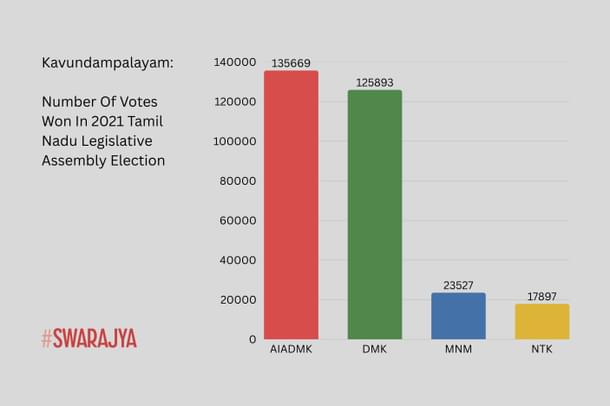
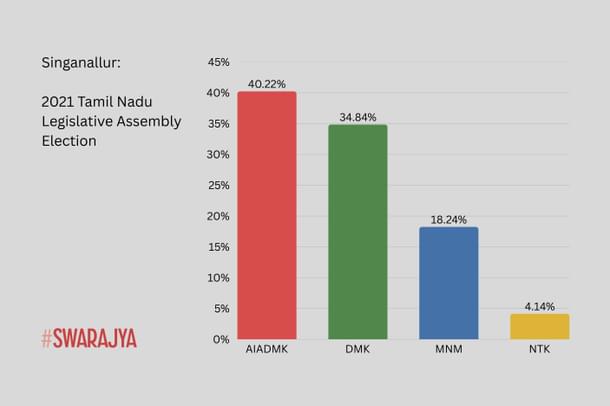
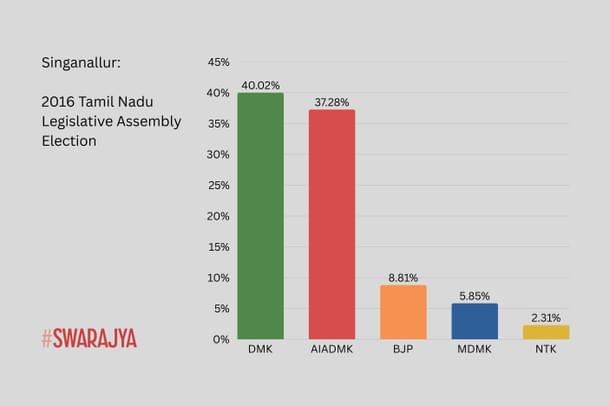
If Vijay crosses the ten percent threshold—a possibility that now seems increasingly plausible—the DMK faces a scenario where its traditional vote bank becomes unreliable in precisely those tight races that determine governmental power.
The party that mastered the art of coalition building and vote bank management may find itself victimized by its own tactical cleverness.
What emerges is a portrait of political miscalculation on a grand scale. The DMK's alleged strategy of encouraging Vijay's political ambitions to damage the opposition may prove to be one of the most consequential own-goals in recent Indian political history. In trying to control the narrative, they may have unleashed forces beyond their ability to contain.
As 2026 approaches, the question is no longer whether Vijay can sustain his political momentum, but whether the DMK can adapt to a reality it helped create. In the game of Tamil Nadu politics, the house may have finally met a player who doesn't just understand the rules, but threatens to rewrite them entirely.
S Rajesh is Staff Writer at Swarajya. He tweets @rajesh_srn.





